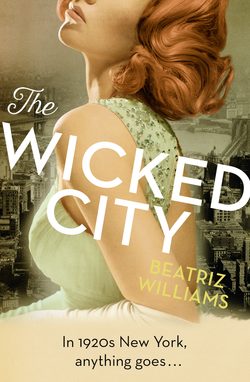Читать книгу The Wicked City - Beatriz Williams, Beatriz Williams - Страница 8
1
ОглавлениеTHERE’S THIS joint on Christopher Street, a joint I’d know like the beat of my own heart, if I happened to have one. They used to call it the Christopher Club, and now it’s just Christopher’s. When you enter through a door in the basement of the grocery next door, you first smell the rotting vegetables and the cat piss, but never worry: all that stink clears up when the cigarettes and the liquor engulf you. And the music. The best jazz south of Ninety-Sixth Street. The bass player’s a good friend of mine. Bruno. I don’t know his last name; nobody does. We don’t deal in surnames unless absolutely necessary.
Now, I don’t inhabit the place every evening—I’m a working girl, you know, and I need my beauty sleep—but as I happen to live on the other side of said grocery, in a tiny room at the back of the fourth floor, I like to drop in from time to time, friendly-like, for a drink and a dance and a smoke and a gossip. As I’m doing now. Right there at the corner table—no, the other corner, next to the music—wearing a black dress and crimson lips and a head of strawberry hair. (The hair’s natural, the lips aren’t.) And that darling rosy-scrubbed black-and-white fellow I’m flirting with, the one who’s taken the trouble to dress like a gentleman? That’s Billy Marshall, my latest. A Princeton boy. You know the type. He’s reading me this poem he’s written in my honor—a real sweetie pie, my Billy-boy—but I’m afraid I’m not listening. A man’s just walked through the door like a prizefighter looking for a prize, the kind of fellow who demands your immediate attention. Square shoulders, bony jaw. Plain gray suit, sharp felt hat. You know the type.
The thing is, you don’t see him around a joint like this, a joint in the Village, long wooden bar and no chandelier, starving artists and starving artists’ models, queers and poets, Jews and Negroes, swank babies like Billy-boy descending southward in search of local color. We haven’t seen a gray suit around here since that stockbroker last year who lost his way back to the IRT station from a Bedford Street brothel on the down-low, if you know what I mean. Where he got the password, God knows. Anyway, this particular suit is cold sober, overcoat over his arm, nose as monochrome as the rest of him. Wouldn’t know a good time if it kissed him on the kisser and unbuttoned his starched white shirt.
Right away, I give the eyebrows to the owner, the man behind the bar—we call him Christopher, nobody knows his real name—and he gives the eyebrows right back, only more in the nature of a question mark. I flick the gaze back to the newcomer. Christopher makes this tiny nod and strolls down the bar, directly in the fellow’s line of sight, and braces two hands on the edge of the counter, like the knots of a terribly thick rope.
“Darling,” says Billy, “are you listening?”
“Of course I’m listening, sweetie. Go on.”
By now, the stranger has reached the bar, along a line right down the center of Christopher’s wingspan. He sets one foot on the rail and one elbow on the counter and he asks for something, I can’t hear what. Over the rim of his shoulder, Christopher’s eyebrows glide upward.
“You don’t like it.”
“I adore it! I think it’s awfully clever. And those rhymes. Why, you could have Bruno here set it to music.”
“It’s a sonnet, Gin, an English sonnet. Not a music-hall song.”
“You can make a lot of bread from a music-hall song.”
“Who cares about money?” He seizes my hand on the table. “I care about you, darling. I care about taking you away from all this.”
“And what if I like all this just fine? It sure beats the place I grew up in. Why, a joint like this is paradise compared to back home.”
“You’re too fine and good to be sitting here in this lousy dump. You deserve a better life, out in the country, where you don’t have to lift a finger, where you don’t have to spend eight hours a day in slavery to some lecherous banker, where you don’t have to think about anything so crass as—”
“You know something, Billy-boy? I generally find that people who say they don’t care about money are the exact same people who’ve never had to earn any.”
“You’re right. You’re quite right. And that’s what I want for—”
“Cherub,” I say kindly, returning his hand, “will you excuse me a moment? It seems my company is required at the bar.”
